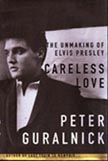|
In this book you get a fascinating portrayal of Elvis' manager, Colonel Tom Parker. Parker would eventually get a substantial 50/50 percent cut with Elvis. Just compare this to the Beatles' manager, Brian Epstein, who only received 25%. It was to the Colonel's credit that Elvis became a regular soldier, NOT performing in the special services - thus endearing him to the older Americans, who were wary of his pre-army rebel image. Whether this was intentional or not, it was a brilliant career move for Elvis, helping him both gain new fans and move on as a performer into films.
Did you ever wonder why Elvis didn't seem to concentrate on his music after the Army? Well, according to this book, that was mainly the doing of the Colonel, who saw any recording not associated with an Elvis movie as a waste of time, effort and money. In the Colonel's mind, the movie promoted the soundtrack and the soundtrack promoted the movie. Also, the Colonel insisted that they control the publishing of all material recorded. This insured that Elvis's recorded material during this period was not only non-experimental or groundbreaking in ANY way, but also painfully mediocre. Also, there was a strange paradox as the quality of each succeeding film script dropped as Elvis' dollar percentage per film increased! With this in mind, you can see why it was difficult for Elvis to stop doing films. It is at this point that the book brings up some little known episodes (at least to me) in the Elvis story that I found so fascinating. While disappointed with both his recent film & recording work, Elvis actually embraced Eastern religion with his very own guru! Also it is around this time that he met with the Beatles in a very anti-climatic summit meeting. I found it ironic that the King embraced Eastern mysticism before the Beatles! Also, Elvis' only known use of LSD (in 1965) is described. While this book is sometimes dry and tedious, the many colorful stores throughout the book make the wait through the boring parts very worth wild. My favorites covered are: the 1968 comeback section and how it recharged Elvis and influenced him to perform live again; Elvis' meeting with Elvis to get a drug agent badge and the story of how Elvis was approached for the lead in the remake of "A Star Is Born". Unfortunately, the book ends on a sad note...hell, we all know the ending! And I was a little disappointed at how little was written about Elvis' death. But, there have been several books that cover just that topic alone. In the 25 years since his death, it is very hard NOT to elevate Elvis above being merely mortal. The strength of this book is that Elvis is portrayed as human, with very human failings, which ultimately lead to his demise. All in all, a good read, but I wouldn't recommend it for the first time Elvis fan.
|
 I'm sort of out of my element when it comes to Elvis. Sure, I'm aware of his impact on rock 'n roll. I have a basic vinyl/CD library of Elvis' recorded work; I've read a couple of Elvis bios; EAR CANDY even started a semi-regular column called "rate an Elvis"; I've seen many of Elvis' movies (both good and bad) and the documentaries. So, I feel that I'm somewhat qualified to review a book on the King. Although this book, CARELESS LOVE, has been out for a few years, I've just recently received a copy. It was the subject matter of this book that caught my attention. This book covers what I consider the most interesting part of Elvis' career - the post 1960 years, or the so-called "decline" of Elvis.
I'm sort of out of my element when it comes to Elvis. Sure, I'm aware of his impact on rock 'n roll. I have a basic vinyl/CD library of Elvis' recorded work; I've read a couple of Elvis bios; EAR CANDY even started a semi-regular column called "rate an Elvis"; I've seen many of Elvis' movies (both good and bad) and the documentaries. So, I feel that I'm somewhat qualified to review a book on the King. Although this book, CARELESS LOVE, has been out for a few years, I've just recently received a copy. It was the subject matter of this book that caught my attention. This book covers what I consider the most interesting part of Elvis' career - the post 1960 years, or the so-called "decline" of Elvis.